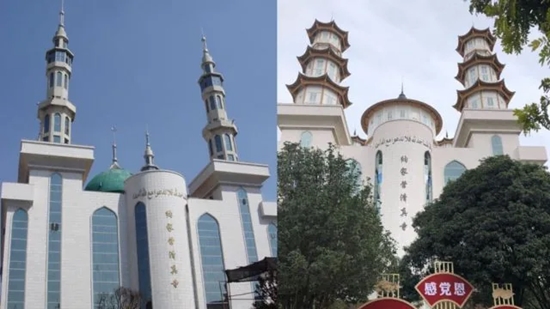
In China, if you don’t fit in, sooner or later you may well be forced to fit in. The process of coercively assimilating minorities and remolding or replacing expressions of culture that the Chinese Communist Party regards as alien—Sinicization—continues apace in the province of Yunnan.
An example cited by Bitter Winter is the Najaying Mosque or former mosque (“Najaying Mosque in Yunnan, Others, Fully Sinicized,” February 28, 2024):
On June 1 and 28, 2023, Bitter Winter reported on protests over the “Sinicization” of the Najaying Mosque in Yunnan, which led to a temporary suspension of the project that later, however, started again.
The protests notwithstanding, the “Sinicization” has now been completed. The original mosque had four minarets and one dome. They have been replaced by Chinese pagoda-style semi-towers….
Najaying Mosque was managed by a democratically elected committee. This has now been replaced by one whose members are appointed by the United Front Working Committee and the local Religious Affairs Office. It seems that the mandate of the new committee is mostly preventing minors from entering the mosque. This is in accordance with Chinese legislation that forbids any participation of those [younger than 18], including infants in their mothers’ arms, in all kind of religious activities.
In May 2023, The Washington Post reported on a clash with police over plans to alter the Najaying Mosque, a result of the fact that a national CCP program of Sinicization was finally being implemented in Yunnan.
As well as restricting international exchanges and donations, authorities have remodeled religious buildings whose outward appearance was deemed insufficiently Chinese….
In recent years…Communist Party restrictions on the pious have escalated sharply. The country’s top leader, Xi Jinping, has demanded absolute political loyalty of faith communities and the “Sinicization” of religion….
Xinjiang, a northwestern region that was home to millions of Turkic-language-speaking Uyghur Muslims, was hit the hardest….
Situated in an ethnically diverse and remote region of China, the Hui of Yunnan are among the last to face scrutiny….
According to Bitter Winter, 80% of the mosques in Yunnan have been Sinicized.
How much of the world recognizes what is happening here? The Encyclopedia Britannica entry on Yunnan, authored by Ping-chia Kuo, Robert Lee Suettinger, and the Editors of Encyclopedia Britannica, assures us that great strides have been made politico-culturally in Yunnan; for example, with respect to “cultural integration into the whole of China” and the instilling of “the ideal of national unification in place of separatism.”
Although richly endowed with natural resources, Yunnan remained an underdeveloped region until relatively recent times; for centuries the ethnic, religious, and political separatism of the province posed obstacles to the efforts of a central government to control it. Although much of the province is still fairly underdeveloped and isolated, its economic, political, and cultural integration into the whole of China is essentially complete….
In the 1930s and 1940s:
A decade of war forced Yunnan out of its stagnation, while its strategic location made it possible to instill the ideal of national unification in place of separatism. The process of modernization was accelerated after the establishment of the People’s Republic in 1949, especially during the period of rapid industrialization and infrastructure construction in the 1960s and early ’70s.
That would be “the ideal of national unification” on the terms dictated by the murderous totalitarian regime of Beijing. The entry does point out that the Chinese Communist Party, “with its own congresses and committees at every level, exercises a controlling power over [Yunnan’s] system of government.” But there’s also this attempt at line-straddling:
The large number of autonomous prefectures and autonomous counties [in Yunnan] reflects the government’s intent to end the traditional antagonism between Han and non-Han peoples. The policy seeks to preserve the languages, customs, and cultural traditions of the minority peoples and to afford equal opportunity to all ethnic groups. Adequate representation of the nationalities on every level of government is a prerequisite. At the same time, the government is determined that the minorities should experience the same socialist transformation as the Han majority.
Yunnan thus is granted wondrously empowering degrees of autonomy and independence, with “equal opportunity to all ethnic groups,” except insofar as ethnic groups and the individuals of these groups must be mashed into the socialist whole. Such verbal attempts at circle-squaring don’t change the reality.





